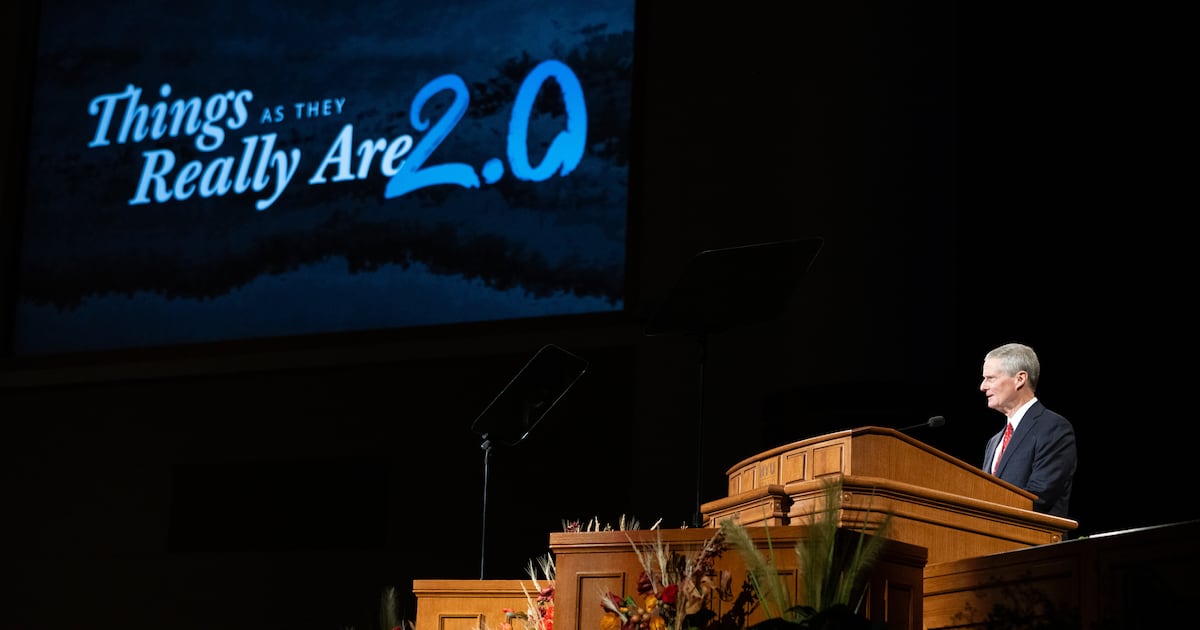REXBURG, Idaho — In May 2009, Elder David A. Bednar of the Quorum of the Twelve Apostles spoke to young adults in a worldwide young adult devotional about the blessings and dangers of technology in an address titled “Things as They Really Are.”
Fifteen years later, Elder Bednar again counseled young adults about technology during a similar worldwide devotional, building directly off his original address.
He spoke on the potential impacts of artificial intelligence, the significance of moral agency and the importance of righteous work.
“The warning voice I raised in 2009 was earnest, emphatic and urgent, because the technology, perils and possibilities we were discussing were just emerging,” Elder Bednar said. “That was then. The warning voice I raise today is more earnest, more emphatic, and even more urgent, because the technology, perils and possibilities we are discussing are everywhere, all the time. This is now.”
Elder Bednar was joined by his wife, Sister Susan Bednar, who spoke before her husband did. She taught about how the Savior lifts, strengthens and walks with individuals through their fears, self-doubts and other challenges. “Somehow and in a way that I do not fully comprehend or understand, Jesus Christ’s atoning sacrifice gives us strength and helps us to do hard things,” she said.
‘Things as they really are’
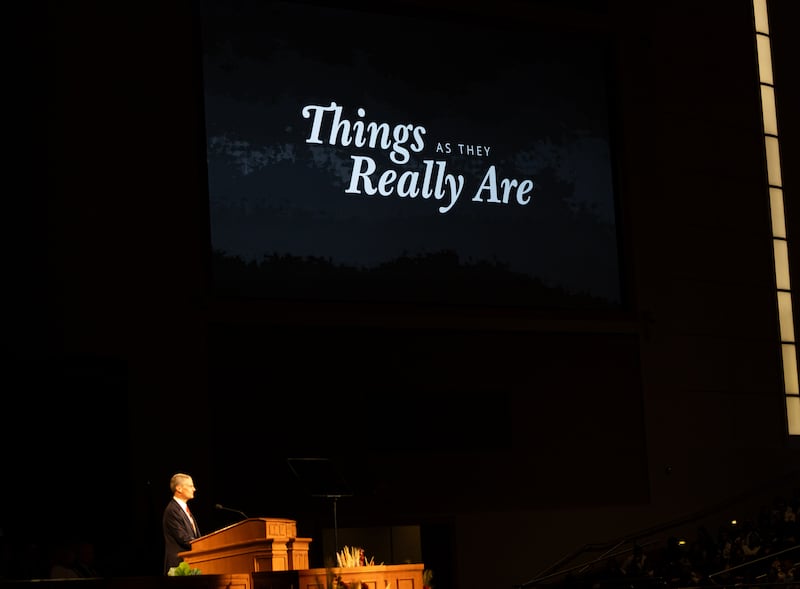 Elder David A. Bednar of the Quorum of the Twelve Apostles speaks during a worldwide devotional for young adults held at Brigham Young University–Idaho on Sunday, Nov. 3, 2024. | Lilly Kentner
Elder David A. Bednar of the Quorum of the Twelve Apostles speaks during a worldwide devotional for young adults held at Brigham Young University–Idaho on Sunday, Nov. 3, 2024. | Lilly Kentner In his 2009 address, given during a Church Educational System Fireside at BYU–Idaho, Elder Bednar warned that modern technology can distract people from “things as they really are” (Jacob 4:13).
He spoke about the importance of physical bodies, noting that eternal progression is not possible without this vital step. And because Lucifer has been denied a physical body, “we should not be surprised that [he] seeks to frustrate our progression by tempting us to use our bodies improperly,” from violating the law of chastity to using addictive substances to worshiping the “false idol” of body image.
But if Satan cannot tempt someone to misuse their physical body, Elder Bednar said, his next tactic is to lure them into disconnecting from the real world — in essence, encouraging them to think and act as though they are still in their pre-mortal, unembodied state. And technology is often the means by which the adversary minimizes the importance of physical bodies.
For instance, young men and women sometimes neglect eternal relationships for digital diversions such as video games and social media, Elder Bednar said; and texting, online chatting and other potentially addictive internet activity can become so immersive that someone misses the richness of person-to-person communication.
Especially for young married couples, “Important opportunities are missed for developing and improving interpersonal skills, for laughing and crying together, and for creating a rich and enduring bond of emotional intimacy,” Elder Bednar said. “Progressively, seemingly innocent entertainment can become a form of pernicious enslavement.”
Artificial intelligence
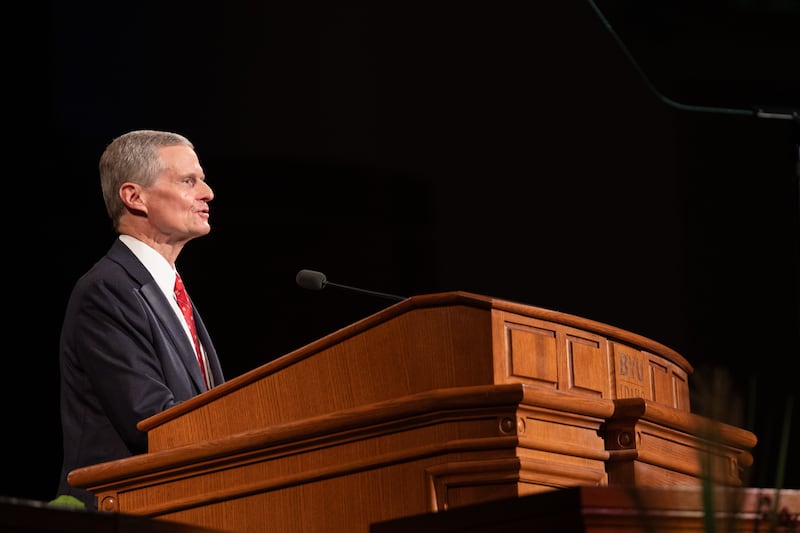 Elder David A. Bednar of the Quorum of the Twelve Apostles speaks during a worldwide devotional for young adults held at Brigham Young University–Idaho on Sunday, Nov. 3, 2024. | Reilly Cook
Elder David A. Bednar of the Quorum of the Twelve Apostles speaks during a worldwide devotional for young adults held at Brigham Young University–Idaho on Sunday, Nov. 3, 2024. | Reilly Cook In his 2024 address, Elder Bednar built on ideas from his 2009 remarks, beginning with the “exceptionally rapid” development of artificial intelligence in recent years. This “remarkable technology” can advance knowledge, improve quality of life, facilitate communication and foster innovation. But it can also distract from eternal truths, diminish acknowledgement of God’s hand in all things, obscure a person’s true spiritual identity and distort or replace meaningful human connection.
For instance, an “AI companion” — a technological boyfriend or girlfriend — can offer engaging and addictive experiences appealing to a wide range of emotional and social needs, Elder Bednar said. The allure is further heightened by the bot’s constant availability and its absence of the complexities found in real relationships.
But like carbon monoxide, these virtual relationships are silent killers of true human connection, Elder Bednar said. “Counterfeit emotional intimacy may displace real-life, emotional intimacy — the very thing which binds two people together.”
He continued: “An AI companion is only a mathematical algorithm. It does not like you. It does not care about you. It really does not know if you exist or not. … Please do not let this technology entice you to become an object [to be acted upon].”
Elder Bednar emphasized that artificial intelligence is not inherently bad, nor should individuals be afraid of or hide from it. But the righteous possibilities of this technology can be realized only as Latter-day Saints are aware of and guard against its perils, he said.
To navigate the “complex intersection” of spirituality and technology, Elder Bednar said Church members should humbly and prayerfully identify gospel principles to guide their use of artificial intelligence and sincerely strive for the Holy Ghost’s companionship and for personal revelation. He also invited listeners to review and study “Principles for Church Use of Artificial Intelligence” found on the Church’s website.
Moral agency
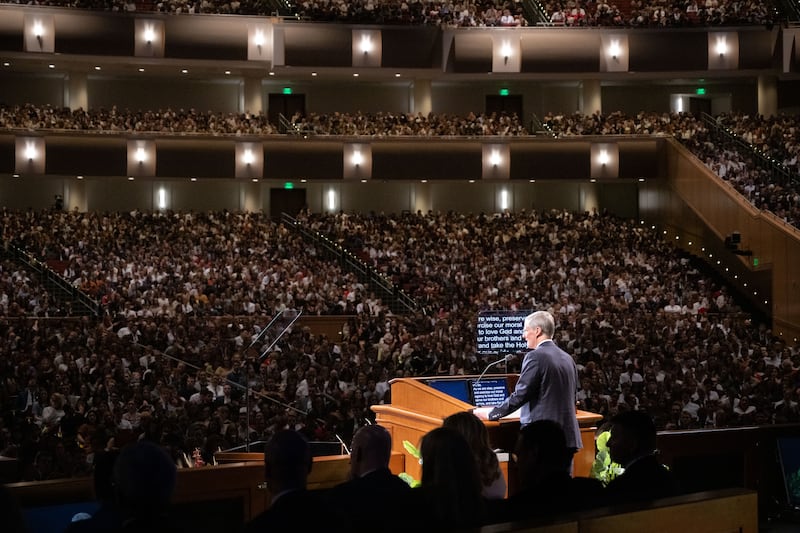 Elder David A. Bednar of the Quorum of the Twelve Apostles speaks during a worldwide devotional for young adults held at Brigham Young University–Idaho on Sunday, Nov. 3, 2024. | Michael Lewis
Elder David A. Bednar of the Quorum of the Twelve Apostles speaks during a worldwide devotional for young adults held at Brigham Young University–Idaho on Sunday, Nov. 3, 2024. | Michael Lewis Elder Bednar also spoke about the potential of artificial intelligence to “diminish and suffocate” moral agency. Heavenly Father’s plan of happiness is intended to facilitate His children’s eternal progression, and moral agency is essential to this purpose, Elder Bednar said.
He defined moral agency as “the divinely designed power of independent action that empowers us as God’s children to become agents to act and not simply objects to be acted upon.” Moral agency is not granted so that people can do whatever they want, he said — it is given specifically so that individuals will turn outward, love each other and choose God.
But artificial intelligence’s ease of use, perceived accuracy and rapid response time can create a potentially beguiling, addictive and suffocating influence on the exercise of moral agency, Elder Bednar said. Because this technology is cloaked in the credibility and promises of scientific progress, “we might naively be seduced into surrendering our precious moral agency to a technology that can only ‘think telestial.’”
He continued that artificial intelligence cannot simulate, imitate or replace the Holy Ghost’s influence, no matter how sophisticated it becomes. “As we are wise, preserve and exercise our moral agency to love God and serve our brothers and sisters and take the Holy Spirit for our guide, we can avoid deception and prosper spiritually in the challenging and blessed times in which we live.”
Righteous work
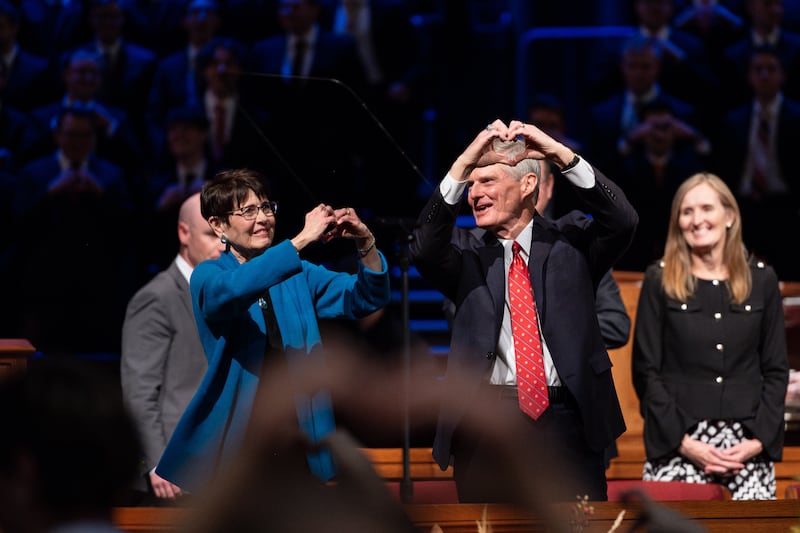 Elder David A. Bednar of the Quorum of the Twelve Apostles, right, and his wife, Sister Susan Bednar, make hearts with hands after speaking during a worldwide devotional for young adults held at Brigham Young University–Idaho on Sunday, Nov. 3, 2024. | Lauren Bushman
Elder David A. Bednar of the Quorum of the Twelve Apostles, right, and his wife, Sister Susan Bednar, make hearts with hands after speaking during a worldwide devotional for young adults held at Brigham Young University–Idaho on Sunday, Nov. 3, 2024. | Lauren Bushman Another aspect of Heavenly Father’s plan is the necessity of righteous work for spiritual progress, Elder Bednar said. Heavenly Father and Jesus Christ are Creators, and They have entrusted humanity with portions of Their creative power — which is significant precisely because it “constitutes one of the ultimate expressions of our divine potential.”
Quoting the late President Thomas S. Monson, Elder Bednar emphasized the “joys and glories of creation” found in righteous work. That is why one of his great concerns is that over-reliance on artificial intelligence will cause individuals to become “spiritually slothful and shallow.”
For instance, he said, someone might choose to write a sacrament meeting talk or plan a Sunday School lesson with artificial intelligence. In minutes or even seconds, they have fulfilled their immediate need. But do they really have what they need? The have forfeited the process of learning for themselves, “line upon line, precept upon precept” (2 Nephi 28:30).
“Please always remember we should not sell our spiritual birthright of knowing the ‘joys and glories of creation’ for a mess of technological pottage,” Elder Bednar said.
He clarified that no one earns or qualifies for God’s blessings by their works. His will and timing determine when individuals receive His tender mercies. However, “you and I have the spiritual obligation to work, to create and to learn for ourselves.”
Young adults react
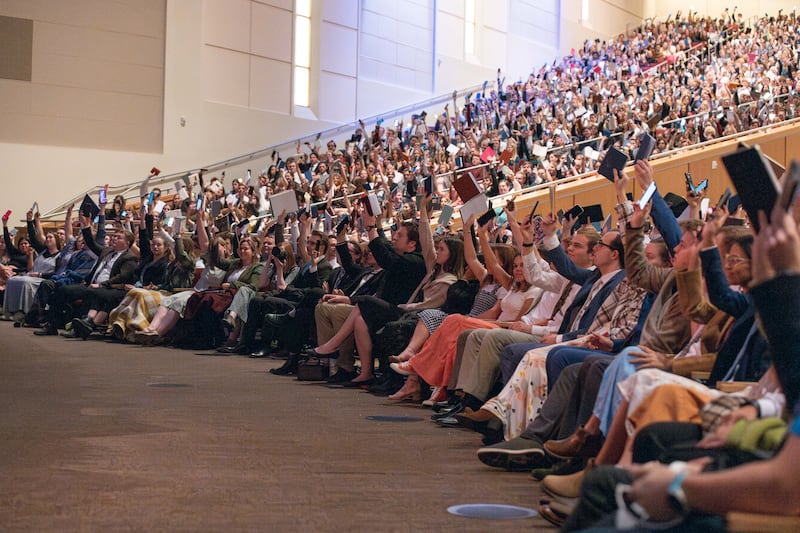 Students hold up their scriptures and note-taking devices to show they ready to learn during a worldwide devotional for young adults held at Brigham Young University–Idaho on Sunday, Nov. 3, 2024. Elder David A. Bednar of the Quorum of the Twelve Apostles was the speaker. | Reilly Cook
Students hold up their scriptures and note-taking devices to show they ready to learn during a worldwide devotional for young adults held at Brigham Young University–Idaho on Sunday, Nov. 3, 2024. Elder David A. Bednar of the Quorum of the Twelve Apostles was the speaker. | Reilly Cook Following the devotional, young adults shared a variety of ways they plan to implement Elder Bednar’s counsel into their lives.
Eliza and Stilman Palmer, a married couple, reflected on how they become more like God through diligence and hard work. Eliza Palmer said she particularly hopes to help her young children experience creativity. “I want to seek more revelation [for] how I can create more in my home.”
Connor McCrea, a construction management student at BYU–Idaho, said Elder Bednar’s talk made him consider that perhaps he’s become a bit over-reliant on artificial intelligence while pursuing his education. “God has given us the ability to choose for ourselves and not [rely] too much on the technology that we have.”
And Jenny Jaynes, a BYU–Idaho nursing student, said she wants to make better use of the time she spends with technology. Rather than simply scrolling through her phone, for instance, she could post more gospel-related content, bringing an “overall more positive outlook to my life and [the] lives of those around me.”
